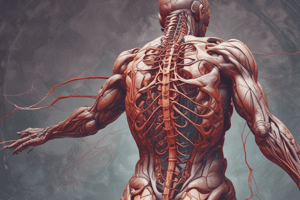Podcast
Questions and Answers
Which organ is covered by visceral pericardium?
Which organ is covered by visceral pericardium?
What is the normal pH range of blood?
What is the normal pH range of blood?
7.35-7.45
Which of the following statements regarding homeostasis is false?
Which of the following statements regarding homeostasis is false?
Which of the following statements regarding epithelial tissues is true?
Which of the following statements regarding epithelial tissues is true?
Signup and view all the answers
Which of the following organelles is essential for energy production?
Which of the following organelles is essential for energy production?
Signup and view all the answers
Which of the following statements regarding erythrocytes is false?
Which of the following statements regarding erythrocytes is false?
Signup and view all the answers
Which of the following structures does not belong to the upper respiratory system?
Which of the following structures does not belong to the upper respiratory system?
Signup and view all the answers
Which of the following statements regarding blood vessels is true?
Which of the following statements regarding blood vessels is true?
Signup and view all the answers
Which of the following statements regarding water reabsorption in the kidney is true?
Which of the following statements regarding water reabsorption in the kidney is true?
Signup and view all the answers
Study Notes
Visceral Pericardium and Organs
- Visceral pericardium covers the heart, providing a protective layer.
- The normal pH range of blood is 7.35-7.45, essential for bodily functions.
Homeostasis
- Homeostasis refers to the body's ability to maintain a stable internal environment.
- It involves nervous and endocrine controls as well as receptors to sense changes.
- False Statement: Homeostasis is not in a static equilibrium; disturbances can lead to diseases.
Epithelial Tissues
- Epithelial tissues rest on a basement membrane, providing structural support.
- Important classifications include:
- Squamous epithelium: cells are thin and flat.
- Cuboidal epithelium: cells are box-shaped.
- True Statement: Epithelial cells generally do not have secretory functions.
Cellular Organelles
- Mitochondria are essential for energy production, acting as the powerhouse of the cell.
- The nucleus, endoplasmic reticulum, and Golgi apparatus have distinct functions but are not directly energy-producing.
Erythrocytes
- Erythrocytes (red blood cells) have a lifespan of about 120 days, primarily transporting oxygen and carbon dioxide.
- False Statement: Erythrocytes are not nucleated; they lack a nucleus to maximize space for hemoglobin.
Respiratory System Structures
- The upper respiratory system includes the nasal cavity, paranasal sinuses, and pharynx.
- The trachea is part of the lower respiratory system, responsible for conducting air to the lungs.
Blood Vessels
- Veins have a larger lumen compared to arteries, allowing for greater blood volume return.
- The tunica media (muscle layer) is absent in capillaries, emphasizing their role in nutrient exchange.
- Vasodilation, the widening of blood vessels, is caused by smooth muscle relaxation.
Kidney Water Reabsorption
- The reabsorption of water primarily occurs in the distal tubule of the nephron.
- Water reabsorption can be influenced by substances like atrial natriuretic peptide (ANP), which reduces blood pressure by promoting excretion.
Respiratory Control
- The spontaneous contraction of respiratory muscles is influenced by various brain centers but is fundamentally autonomic.
- The basic rhythm of respiration is regulated by the body, allowing for some level of conscious control over ventilation.
Studying That Suits You
Use AI to generate personalized quizzes and flashcards to suit your learning preferences.
Related Documents
Description
Test your knowledge on the human body's organs and their functions with this quiz. It covers topics like the visceral pericardium, blood pH levels, and homeostasis. Ideal for students of anatomy and physiology.





